The benefits of open innovation and collective intelligence were on display throughout Episode 3: Science Takes Manufacturing To New Levels of Dassault Systemes Science in the Age of Experience virtual event.
Register now to watch Episode 3 for the first time, or log in through your personal link to watch again.
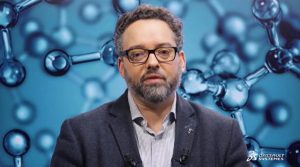
Hosted by Patrick Johnson, Sciences & Corporate Research, Senior Vice-President, Dassault Systèmes, the episode put the focus on the rising importance of earlier integration of sustainability into product design, recycling within the circle economy, new approaches to improve manufacturing efficiency, and applying sustainability for supersonic air travel.
First on the program was David Clark, Vice President for Sustainability and leader of global sustainability at Amcor. Amcor manufactures packaging to protect products from the time they are manufactured through distribution and use or consumption.
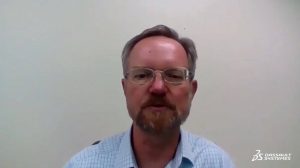
“People are living longer and are healthier than ever before,” said David, “and a big reason for that is the way we produce and grow food, the way that we’re able to store it and keep it fresh and safe, distribute it where it’s needed, so that it’s available to people around the world.”
Amcor wants to optimize environmental impact and reduce packaging waste. Its goal is that all its packaging is recyclable by 2025. Responsible packaging is part of the answer – but it also needs a recycling infrastructure and support via consumer and societal attitudes and behavior. Recycling has to work within a system.
That point was echoed in the next presentation from Sebastien Flichy of VEOLIA.
“We are dealing with the end of life with products,” said Sebastien, “but we can see there is a real gap between the end of life and product design. If you look at product design, there are a lot of questions not clearly looked at to be sure that the end of life is properly managed.”
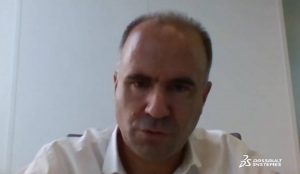
Sebastien pointed to the strong increase in environmental awareness, and new regulations that have created more stringent international packaging laws, especially for plastic. Companies have no choice but to follow this path, he said.
VEOLIA is a leader in providing a comprehensive range of waste, water and energy management services. It has even started using artificial intelligence (AI) in its operations to identify, sort and separate different types of waste.
Next, Dr. Byron Pipes, John L. Bray Distinguished Professor of Engineering at Purdue University and head of the Indiana Center of Excellence of the U.S. Department of Energy Institute for Advanced Composites Manufacturing Innovation, joined the session to introduce the next presenter.
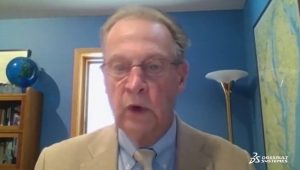
Dr. Pipes brings together corporate, academic and government sectors for research and education in the field of composite materials. He introduced Dr. Guru Madhavan, the Norman R. Augustine Senior Scholar and Senior Director of Programs of the National Academy of Engineering.
A systems engineer by background, Dr. Madhavan leads activities covering broad scope and complexity, focused on engineering practice, education, research, communication and policies. Dr. Madhavan’s took us on a journey through The Tale of 3 Efficiencies, showing that scientific research and resolution are not always clear cut.
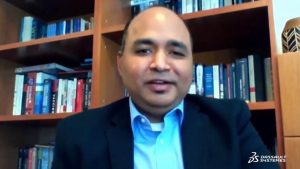
Hard Efficiency is narrow and bound-able, Solved by scientific principles with specific results. With Soft Efficiency, the end point is vague and political factors creep in. His example was the discovery, understanding and complex production of penicillin that saved millions of lives in World War II. Soft Efficiency issues cannot be brute-force-solved and they get Resolved with effort and insight over time.
For Messy Efficiency, there is only a starting point with many unclear ideas about possible destinations. Examples were energy efficiency and responding to the Ebola crisis, where standard analysis can completely distort conclusions.
“Messy problems cannot be Solved or Resolved, they can only be Dissolved, that is, they need to be transformed into a manageable state, an agreed upon state,” said Dr. Madhavan. “They can only be sedated potentially, rather than yield a pure solution.”
You can access Dr. Madhavan’s full presentation by registering here to watch Episode 3 for the first time, or logging in through your personal link to the event.
Dr. Madhavan also announced an advanced initiative to the understanding of complex techno-social systems to identify unifiable approaches – that leverage capabilities across different practices and paths of inquiry – to better manage them. The FOCUS Initiative – Forum on Complex Unifiable Systems – a new National Academy of Engineering program was started in 2020 with Dassault Systèmes as a sponsor.
The final presentation introduced us to the new world of sustainable, commercial supersonic flight. Boom Supersonic has a sub-scale prototype set to take flight next year of its Mach-2.2 airliner called Overture. It will be the first independently developed supersonic jet in history and the world’s fastest civil aircraft.
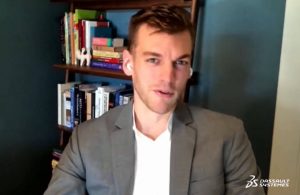
“Today’s commercial airplanes don’t fly any faster than the first generation jets of the 1950s and 60s,” said Raymond Russell, head of sustainability and environmental initiatives at Boom Supersonic. “This is the longest period we’ve gone without a meaningful improvement in travel speed since the days of the railroad.”
What were insurmountable challenges for the historic Concorde supersonic aircraft are now solvable to make supersonic flight more sustainable. It took months of manual aircraft design and wind tunnel testing to work out aerodynamics that is now done overnight with computer design and simulation. Advanced carbon-composite materials solve problems of extreme heat and cold in flight. Propulsion systems are quieter with fuel efficient engines and increased use of SAF (sustainable aviation fuels).
Episode 3 concluded with a live online panel discussion hosted by Reza Sedeghi, Chief Strategy Officer, BIOVIA, Dassault Systèmes, with panelists David Clark from Amcor, Sebastien Flichy of VEOLIA, Guru Madhavan of the National Academy of Engineering, and Raymond Russell from Boom Supersonic.
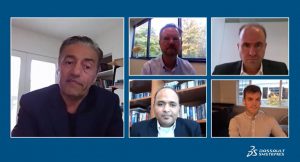
The panel discussed how far away we are from the circular economy, looking at the need for collaboration, a shift from linear thinking to thinking in a circular manner, and the need to build connections taking into account all the steps from an engineering and a social perspective to optimize solutions.
You can watch the full panel discussion and all the presentations from Episode 3: Science Takes Manufacturing To New Levels by registering now for access. (If you already registered for the event, you can watch it again using your access link.)
And REGISTER NOW for
EPISODE 4: TOMORROW’S SUSTAINABLE CITIES, TUESDAY, NOVEMBER 10, 2020 – making cities sustainable and citizen-focused in the face of growing challenges – environment, natural disasters, mobility, public health and safety.

